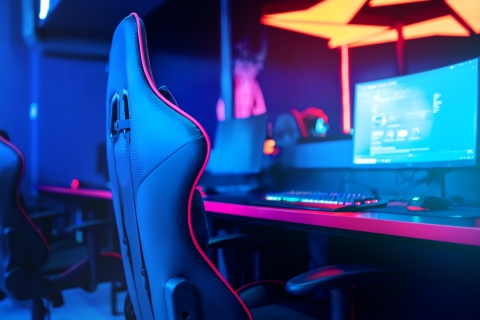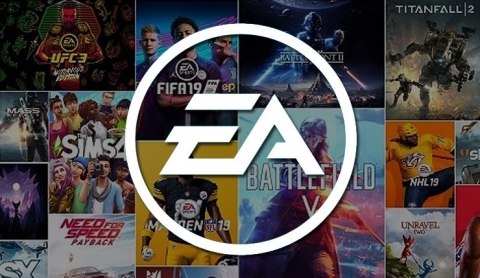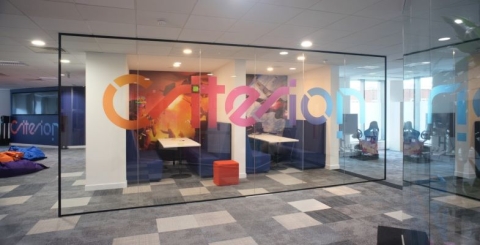

Computer Games Technology student, Prisha, on her placement experience
9 min read
Prisha Gellaboina is a BSc (Hons) Computer Games Technology student on placement as a Software Engineer Intern at Criterion Games (EA) in Guildford.
How did you find your placement role?
I had been actively searching for placement vacancies and the university’s Creative Careers Work Placements website, which is where I found this vacancy, was a big help. The website has a filter to search for vacancies related to your specific course as well as all the details for each vacancy and a link to apply. The link allowed me to fill in an application form and submit my CV on EA’s website. I also just Google searched for open roles which I would recommend too.
How many applications did you make?
I applied to 10 companies for a role related to games programming, out of which I got six invitations to interview and two online assessments. Each company had two or three rounds of interviews; they were mostly online over Zoom as only the last round of interviews is usually in person. Overall, I only got one offer out of the 10 roles I applied for, so if I had to give one piece of advice to give, it would be that resilience is key.
How did Creative Careers support you in your placement search?
The Creative Careers website has a lot of useful information when preparing to apply for placements, as well as industry-related events and talks to help you network. Following the tips on Moodle I made a rough draft of a CV and booked an appointment with the Creative Careers team. At the appointment I was given very helpful advice to improve my CV, cover letter, portfolio, LinkedIn profile, interview answers and overall application. As I mentioned previously, the Creative Careers Work Placements database was also very helpful when searching for vacancies.
Who is your employer?
Criterion Games, a division of Criterion Software which became a subsidiary of Electronic Arts (EA) in 2004 was founded in 1996 (under the ownership of Canon Inc.). It's a game development company based in Guildford. Some of the most popular titles developed by Criterion include the Need for Speed, Burnout, Battlefield and the Star Wars series.

Which department do you work in?
I currently work in the programming department as part of the Core Gameplay team. During my interview process I was asked which specialisation of games programming I was most interested in, such as UI, AI, audio, graphics, physics, etc. I was placed in the Gameplay Events team. There is, however, a lot of freedom to explore your interests and I might have the chance to work under the AI team later in my internship.
What is your role?
As a software engineer intern at a games studio, my role involves efficiently implementing and integrating the features assigned to me to the existing system. I'm communicating with people from all areas, such as art or design, to work together on aspects of the game and most importantly, learn! Learning is a big part of this role as it is often your first job in the industry, and Criterion encourages interns to explore their interests, ask questions and suggest ideas.
Are you treated like an employee?
I am absolutely treated like an employee, both in terms of the actual work as well as the work environment! As my internship has been remote, arrangements had been made to make it as convenient as possible for me to start work. My manager, Caitlin, made sure any tech I needed was provided for me, such as a webcam and extra monitor. I am invited to all meetings with other engineers to discuss the planning stages before each sprint (2-week work segment) and even asked for feedback and ideas for the game. I am also given my own features to work on for the game, giving me a sense of ownership over my work. At the same time, I am very well-supported, with a “mentor” assigned to me in the team who I can ask any questions to.
How is your placement related to your university degree?
My placement is very relevant to my degree. I am studying Games Technology with a focus on programming and my placement role is games programming-centric. It has helped me prepare mentally for working in the industry in the future. I have a better idea of what to expect, as well as learning more about where my skills and interests lie in different fields of programming.
What are the benefits of being on a placement?
There are so many benefits of doing a placement. It is a great learning experience and insight into how it feels to work in the industry i.e., making games in a games studio as part of a large company as opposed to small student teams. Apart from the degree-relevant skills you learn, it also counts as work experience which is very helpful when applying to graduate roles in the future. I can say with confidence my programming and problem-solving abilities have improved since I started working at EA, which will help me in my third year at university and at interviews when I graduate.
What have you most enjoyed?
The feeling of accomplishment when I successfully complete a task and implement something I’ve learnt. Every task I finish is an achievement to me and seeing my work in the game and hearing positive feedback from co-workers as they play the game is my favourite thing about this job.
What have you least enjoyed?
It’s difficult to think of things I didn’t enjoy about this internship, but it was slightly challenging being trained remotely when starting and getting used to working for large chunks of the day online as one would in an office. There is, however, a lot of support when it comes to being onboarded and the team is very understanding of the circumstances. I would also have liked to meet some of the team in person and experience working in the studio which was not possible this year.

What concerns did you have before going on placement?
I was very concerned before starting my placement that I would struggle with the work and not fit in to the workplace. These concerns were because this is my first job in the industry, my first “9-5” job and general feelings of intimidation. It became very clear to me within the first few weeks of work that I had all the support I could ask for and will never have any unfair expectations placed upon me.
While I am constantly challenged, I am never pushed so far outside of my comfort zone that I feel lost or overwhelmed. An environment like this has helped me harness my potential to solve problems for myself and become a more independent learner comfortably.
What advice would you give to someone worried about doing a placement?
Doing a placement can be daunting, but in my experience, everything I was concerned about was eventually resolved or a non-issue from the start! My advice would be to ask questions. You can do this at interviews, with Creative Careers advisors, students who have already done a placement and even online. I found other points of view to be better than overthinking a concern by yourself.
What new skills have you developed?
Like I mentioned previously, I have definitely improved my programming skills, as well as my general team working and communication. Working on a game that uses a private game engine was challenging as I could not look up solutions to some of the errors online. This has improved my debugging and problem-solving skills which will be useful for a graduate job in the future, as I am expected to be more independent in my work. Secondly, unlike my projects at university, the game I’ve been working on at EA is a large project with plenty of existing code files. Learning how to work with an existing system in terms of understanding other programmers’ code and following the same coding standards and processes is a very important skill I’m developing.
Have you applied anything you learned at university?
Yes, absolutely. Many skills I have learnt at university have come in handy at EA. First, my basic programming and game development knowledge made it easier for me to understand how the existing software system works at EA and how to work with it.
Secondly, I was able to study game art and design on my course, which has helped me to better understand and communicate with artists and designers on the team to work with them. Apart from hard skills, my university course has improved my team working and time management skills in general.
What training have you done?
My manager walked me through EA’s private game engine and gave me some tutorials to practice with. Previously I had only been comfortable using Unity, which is another (simpler) game engine. I feel it is definitely beneficial for me to know how to use more than one type of game engine in order to work in the industry, as there are different types of engines used in different companies.
What have been the highlights so far?
Seeing the game being played in our “milestone” playthroughs is always one of the main highlights of working here for me. I really enjoy seeing how far the game as come, envisioning the final product and seeing my work come to life in the game.
Has the placement helped you with your career decisions?
This placement has been enlightening for me in so many ways. After seeing what its like to work in the industry, in a games studio with a friendly work environment, it has only solidified my decision to become a games programmer. I have learnt that I genuinely enjoy the work and I have the opportunity to explore different types of programming to decide which specialisations I am interested in.
What are your plans for your final year and beyond?
I plan to apply to extend my internship contract and work part-time at EA through my third year at university. If this is not possible, I would just focus on getting the best marks on my dissertation and re-applying to work at EA once I graduate as well as other similar games studios. My ultimate goal is to become a senior software engineer at a well-known games company within 10 years. After I have achieved this, I may consider even opening my own little indie games studio, but that will be far in the future after I have worked at studios to gain as much experience as I can.
What advice would you give to students who aren’t sure whether to do a placement or not?
I would 100% recommend doing a placement. There are so many advantages of doing one: experience before you even graduate, a taster of working in a professional workplace, learning skills you do not get to learn at university, an upper hand when doing your third year, learning more about your skills and interests, connections from networking with co-workers and the salary is just an added benefit compared to what you can and will learn.
Any tips about searching for placements?
Finding the right placement for you can be an overwhelming and stressful process. Altering your CV and cover letters to match the role, doing your research about the companies, preparing for interviews, making it through more than one round to not get the final offer can be very discouraging. My advice to you is to not give up!
Apply to as many roles as you can and don’t be hard on yourself if you don’t get any offers. Even if it feels like a waste of time, every single interview is more experience under your belt, moulding you to be the ideal candidate for the job you finally do get – and this makes it all worth it!





